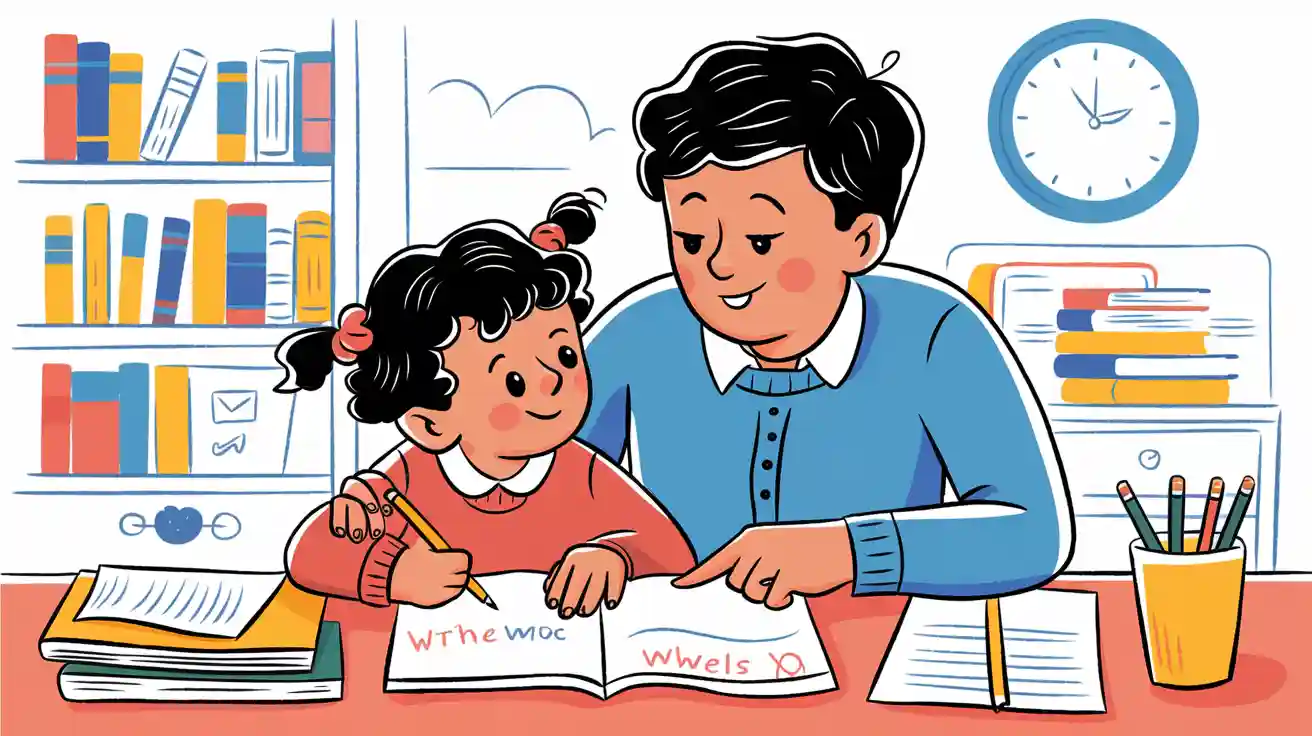How to Prepare Your Child for the 11 Plus Exams

Helping kids do well in the 11 Plus exam requires more than just studying. Parents play a crucial role in boosting confidence and fostering a love for learning. By planning effectively and providing consistent support, you can simplify this process. Preparing for the 11 Plus also involves understanding what your child needs and equipping them with tools that align with their preferred learning styles. With sound advice and valuable 11+ tutoring tips, you can empower your child to approach this test with resilience and focus.
Key Takeaways
Begin preparing early for the 11 Plus exam. Set simple, clear goals to keep your child focused and motivated.
Make a balanced study plan with subjects like English, Maths, and reasoning. Use different learning activities to keep it interesting.
Add practice papers and mock exams to the routine. These help your child understand the exam format and manage time better.
Watch for signs of tiredness and let your child rest. Teach relaxation methods to stay calm and focused while studying.
Celebrate your child's progress, even small wins. Rewards can build their confidence and encourage them to keep learning.
Understanding the 11 Plus Exam Format
To prepare for the 11 Plus exam, start by learning its format. Knowing the structure helps you support your child better and boosts their confidence.
Key Features of the 11 Plus Exam
The 11 Plus exam checks a child’s academic ability for school entry. It often includes multiple-choice and written questions, depending on the board. Timing is important, as each section has strict time limits.
The exam results differ across groups. For instance, White British students pass at 21%, the highest rate. Only 3.6% of students on free school meals succeed. Disadvantaged students score 20 marks lower than others, even if they perform well in primary school. This shows the need for tailored preparation to overcome challenges.
Demographic Group | Pass Rate (%) | Notes |
|---|---|---|
White British | 21 | Highest pass rate among ethnic groups. |
Pakistani | 10 | Significant disadvantage despite being a large applicant group. |
Eligible for Free School Meals | 3.6 | Only 10 out of 276 passed the exam in 2014. |
Higher-attaining from Poor Postcodes | 20 marks less | Even with similar primary school scores, disadvantaged students scored lower on average. |
Subjects and Skills Assessed
The 11 Plus exam tests different subjects and skills to see if a child is ready for selective schools. These include:
English: Tests reading and language understanding.
Maths: Includes arithmetic and problem-solving tasks.
Verbal Reasoning: Measures logical thinking and language use.
Non-Verbal Reasoning: Looks at spatial skills and patterns.
Maths questions range from simple sums to tricky problems. Some tasks require students to learn new ideas quickly. Using adaptive learning can help tailor study plans to each child’s needs.
Subject/Skill | Description |
|---|---|
English | Focuses on comprehension and language skills. |
Maths | Covers fundamental arithmetic and problem-solving questions. |
Verbal Reasoning | Assesses logical thinking and understanding of language. |
Non-Verbal Reasoning | Tests spatial awareness and pattern recognition. |
Adaptive Learning | Tailors preparation based on individual pupil needs. |
Exam Boards and Regional Differences
The 11 Plus exam format changes based on the board and region. Some areas use CEM exams, which focus on reasoning and problem-solving. Others use GL Assessment, which tests traditional subjects like English and Maths.
Regions also test different subjects. Some include reasoning skills, while others stick to core subjects. To prepare well, research your local exam board and syllabus. This ensures your child’s study plan matches their exam requirements.
Creating a Study Plan to Prepare for Entrance Exams

Starting Early and Setting Goals
Begin early to give your child enough time to prepare. Set clear goals that are easy to achieve. Break these goals into smaller steps to make studying easier. Focus on one subject or skill at a time before moving to the next. This helps your child feel confident and see their progress.
Use a planner or calendar to organise study times. Assign specific days for each subject and include regular reviews to strengthen learning. Motivate your child to set personal targets, like finishing practice questions or solving maths problems faster. These goals keep them focused and inspired.
Balancing Core Subjects and Skills
A good study plan covers all the skills needed for the exam. Split study time between main subjects like English and Maths and reasoning skills like verbal and non-verbal reasoning. Each area is important because the exam tests many abilities.
Use different ways to learn during study sessions. For English, try reading exercises and building vocabulary. For Maths, focus on solving problems and practising mental arithmetic. Add reasoning practice by working on puzzles and spotting patterns. Mixing methods keeps your child interested and helps them learn a variety of skills.
Incorporating Breaks and Relaxation
Taking breaks during study time is important for staying focused. Short breaks, from 5 to 60 minutes, can refresh the mind and body. Activities like deep breathing, light exercise, or laughing can help your child feel energised.
Relaxation methods, like mindfulness or yoga, can reduce stress and improve focus. These activities help your child stay calm while studying. Avoid distractions like social media during breaks, as they can interrupt concentration. Choose activities that truly relax the mind. A rested and calm mind works better and handles tough tasks more easily.
Using Practice Papers and Materials
Benefits of Practice Papers
Practice papers are a great way to get ready for the 11 Plus exam. They help your child understand the exam layout and question styles. Doing these papers often improves time management by practising under timed conditions. This helps your child finish sections on time during the real exam.
These papers also show where your child is strong or needs help. You can adjust their study plan to focus on weaker areas. For instance, if verbal reasoning is tricky, add more practice questions for it. Start using practice papers midway through the study plan. This gives your child time to get used to the exam while improving their skills.
Evidence Type | Description |
|---|---|
Familiarisation with Exam Format | Practice papers show the layout and question types in the exam. |
Time Management Improvement | Timed practice helps students manage their time better during the exam. |
Identification of Strengths/Weaknesses | Practice papers reveal areas needing improvement, allowing focused study. |
Familiarising with Question Types
Knowing the question types in the 11 Plus exam is key to doing well. Practice papers and workbooks show different question examples, making your child comfortable with them. For example, problem-solving tests maths reasoning, while reading comprehension checks understanding of texts. Being familiar with these reduces stress and builds confidence.
Question Type | Description |
|---|---|
Problem Solving | Tests maths reasoning and problem-solving skills. |
Data Sufficiency | Checks how well students analyse data and find needed information. |
Sentence Correction | Tests grammar and clear writing in English. |
Reading Comprehension | Measures how well students understand written texts. |
Critical Reasoning | Assesses logical thinking and argument analysis. |
Encourage your child to practise both multiple-choice and written questions. This helps them build a wide range of skills for the exam.
Mock Exams for Confidence Building
Mock exams are very helpful for 11 Plus exam preparation. They copy the real exam setting, helping your child feel confident and less nervous. Mock exams teach time management and how to stay calm under pressure. They also show progress, so you can adjust study plans if needed.
Plan mock exams regularly during the preparation period. After each one, go over the results with your child to find areas to improve. Celebrate their achievements to keep them motivated and focused.
Tip: Use mock exams along with practice papers for a complete preparation plan. This ensures your child is ready for both the content and the exam experience.
Developing Key Skills for Success
Building Strong Maths and English Skills
Having solid Maths and English skills is vital for the 11 Plus exam. In Maths, focus on arithmetic, fractions, and solving problems. Daily mental maths practice helps improve speed and accuracy. These are important for timed exams. For English, reading regularly is essential. Read different types of texts like stories, articles, and poems. This builds vocabulary and improves understanding. Talking about what they read also boosts critical thinking.
Use tools like Hodder Education 11+ Workbooks to help your child. These workbooks teach speed techniques and build vocabulary. Combine them with Hodder Education Practice Papers for realistic test practice. Atom Learning’s adaptive tools personalise practice, focusing on areas needing improvement.
Resource | Benefits |
|---|---|
Hodder Education 11+ Workbooks | Teaches question styles, speed techniques, and vocabulary building |
Hodder Education Practice Papers | Offers realistic tests and explained answers for better preparation |
Atom Learning | Provides personalised practice and a large question bank |
Improving Verbal and Non-Verbal Reasoning
Verbal and non-verbal reasoning are key parts of the 11 Plus exam. Verbal reasoning checks how well your child understands language. Non-verbal reasoning looks at their ability to spot patterns and shapes. These skills are not just for exams but also for future success. Good verbal reasoning improves communication and problem-solving, which are useful in life.
Add puzzles, crosswords, and logic games to their routine to build these skills. Atom Learning offers many questions for verbal and non-verbal reasoning practice. The table below shows why these skills matter:
Key Point | Importance |
|---|---|
Verbal reasoning improves communication | Helps with teamwork and collaboration |
Strong verbal skills aid problem-solving | Leads to better decisions and solutions |
Weak verbal reasoning causes misunderstandings | Can lead to poor teamwork and communication |
Learning Time Management Skills
Time management is very important for exam success. Teach your child to divide time wisely for each exam section. Use timers during practice to copy real exam conditions. Suggest starting with easier questions before harder ones. This builds confidence and helps them score better.
Studies show that managing time well improves learning and results. Research proves students who plan their time perform better and remember more. Adding time management to their study routine keeps them organised and focused.
Evidence Description | Findings |
|---|---|
Study on time use during exams | |
Research on time habits | Helps students learn and retain knowledge |
Study on digital time use | Highlights time management’s role in success |
Tip: Remind your child to check their answers if they finish early. This can help fix mistakes and improve their score.
Managing Stress and Motivation

Making Learning Fun and Engaging
Keeping your child interested in 11 plus prep can be tough. Making study time enjoyable helps them stay focused. Studies show that using games in learning boosts results. Try educational games, quizzes, or apps to make studying fun. For example, turn learning new words into a word game. Use puzzles to practise reasoning skills and make it feel less boring.
Adding variety to study plans also keeps things exciting. Switch between subjects and include creative tasks like drawing or storytelling. These activities make learning enjoyable and easier to remember. When kids have fun, they stay motivated and work harder.
Recognising and Addressing Burnout
Burnout can slow your child’s progress, so spot it early. Watch for changes like poor sleep, mood swings, or losing interest in studying. A clear study plan can make tasks feel less overwhelming. Break work into smaller parts and encourage regular breaks. Activities like deep breathing or light exercise can lower stress and improve focus.
Good health is key to handling stress. Make sure your child sleeps well, eats healthy meals, and stays active. Research shows these habits improve focus and performance. If stress continues, ask for help from teachers, tutors, or family members to create a supportive environment.
Celebrating Progress and Small Wins
Celebrating your child’s efforts, even small ones, builds confidence. Tracking their progress shows how much they’ve improved, which motivates them. Celebrate milestones like finishing a tough practice paper or solving maths problems faster. Each success helps them grow stronger and more determined.
Use rewards to make celebrations special. A favourite snack or fun activity can be a treat for reaching a goal. These rewards show your child that their hard work matters. This keeps them motivated to continue preparing for the 11 plus exam.
Tip: Focus on rewarding effort, not just results. This helps build a positive attitude and keeps children motivated.
11+ Tutoring Tips and External Support
Should You Hire a Tutor?
Getting a tutor can really help your child prepare well. Tutors give personal help, focusing on weak areas. This builds confidence and improves chances of passing the exam. But tutors are in high demand, and their fees differ. Look for a tutor who matches your child’s learning style.
If hiring a tutor isn’t possible, you can still assist. Parents good at English and maths can use study guides to teach. Spend time practising together to strengthen your child’s skills for the exam.
Using Online Tools and Resources
Online tools offer many ways to help your child study. These platforms make learning fun and keep kids interested. Some use smart systems to focus on areas needing improvement. This saves time and makes studying more effective.
Schools have shown how useful online tools can be. For example, Coventry University used special worksheets to boost confidence. Another university completed thousands of activities with online solutions. These examples show how online resources can improve learning.
Mixing Tutoring with Self-Study
Using both tutoring and self-study is a good plan. Tutors give expert advice, while self-study teaches discipline. Encourage your child to understand ideas instead of just memorising. This helps them solve problems better during the exam.
To stay focused, include breaks and fun activities in the study plan. Break topics into smaller parts to make studying easier. Add relaxing activities like exercise or mindfulness to avoid stress. This mix of tutoring and self-study prepares your child well for the exam.
Getting ready for the 11 Plus exam needs more than studying. A good plan makes preparation easier and less stressful. Regular practice helps your child feel confident and remember things longer. The table below shows why planning is important:
Benefit of Study Planning | Explanation |
|---|---|
Better memory | Studying regularly helps the brain keep information for longer. |
Easier preparation | A clear schedule splits work into small parts, making it less overwhelming. |
Less stress | Knowing what to study each day keeps things organised and calm. |
Full topic coverage | A balanced plan ensures no subjects are missed, avoiding knowledge gaps. |
Adapt the plan to suit your child’s strengths and celebrate their wins. With the right method, you can help them succeed in exams and gain useful skills for life.
FAQ
When should my child start preparing for the 11 Plus exam?
Starting in Year 4 (ages 8–9) is a good idea. This gives enough time to learn without rushing. But every child is unique, so think about their confidence and learning speed.
How long should my child study each day?
Plan for 1–2 hours of focused study daily. Short, regular sessions are better than long ones. Add breaks to keep them energised and interested. Adjust the time based on their schoolwork and energy levels.
Are practice papers enough to prepare for the 11 Plus?
Practice papers are important but not enough by themselves. Mix them with activities like reading, puzzles, and reasoning games. This helps your child understand all the subjects better.
How can I keep my child motivated?
Celebrate small wins to boost their confidence. Offer rewards like a treat or extra playtime. Make studying fun with games and interactive tools. A happy and supportive environment keeps them motivated.
Should my child take mock exams?
Yes, mock exams are very helpful. They copy real exam settings, teaching time management and reducing stress. Regular mocks also show where they need more practice, so you can adjust their study plan.
Tip: Go over mock exam results together to find strengths and weaknesses. This builds confidence and helps them improve.
See Also
Selecting The Ideal Tutor For Your Child's Needs
Why Parents Rely On Suited Tutor For Educational Success
Overcoming Academic Hurdles: A Resource For All Involved
Practical Strategies For Children To Manage Academic Stress
How Customised Tutoring From Suited Tutor Transforms Learning

